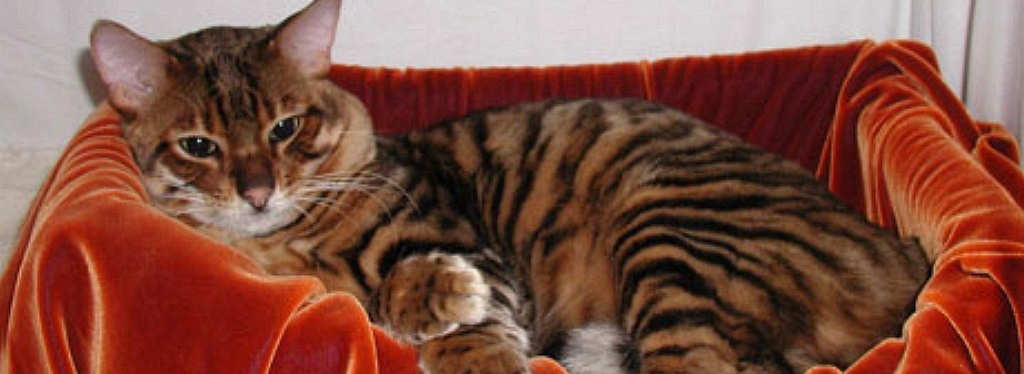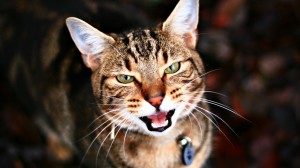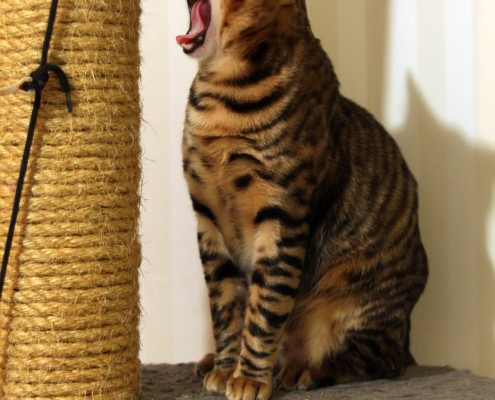Toyger

Meoww!!
The Toygers are medium sized cats – not the largest or smallest of domestic breeds. It has a reddish orange or tan colored coat with black tiger stripes, making it look like a miniature version of a tiger.
In 5 Words
- Quiet
- Outgoing
- Friendly
- Active
- Alert
Snapshot
Size: medium
Weight: 7-15 lbs
Origin: United States of America
Life Span: up to 13 years
Colour: orange/tan background with dark stripes like that of a Tiger.

Characteristics
Learn About the Toyger
The toyger is a breed of domestic cat, the result of breeding domestic shorthaired tabbies (beginning in the 1980s) to make them resemble a “toy tiger”, as its striped coat is reminiscent of the tiger’s. The breed’s creator, Judy Sugden, has stated that the breed was developed in order to inspire people to care about the conservation of tigers in the wild. The introduction of the Bengal breed into the gene pool was a move on Sudgen’s part to produce a “big cat body”. The Toyger cat is the result of many years of hard work. Breeding a striped domestic shorthair cat to a standard Bengal tabby.
The end result was a miniature tiger that has the fur and glitter of a real Bengal Tiger, but with excellent temperament. Ideally, the Toyger cat has dark stripes just like a tiger laid over a background of orange/tan. . Together with the vivid colours this produced, coupled with a laid-back temperament to make a perfect domestic pet, Judy Sugden was well on the way to breeding her ideal cat with these initial matings. As her ideal mini-tiger gradually came to fruition, she was joined in this early breeding programme by a small handful of other breeders.The International Cat Association began registering the Toyger in 1993, advanced it to new breed status in 2000, and granted the breed full championship recognition in 2007. Currently, TICA is the only association that recognizes the Toyger.
The Toygers are medium sized cats – not the largest or smallest of domestic breeds. Males are bigger than females. On average males are between 12-16 lbs. as adults and females are between 7-12 lbs. as adults. It has a reddish orange or tan colored coat with black tiger stripes, making it look like a miniature version of a tiger. It has a long muscular tail, a strong torso, and a coat that is thick, soft, and plush, which makes it look very elegant and luxurious.
All of these features are contained in a medium-sized body built like any domestic cat. Although still in development, some of the most ideal features of this breed include a small rounded set of ears and a strong wide chin. Some physical attributes that are still being developed include smaller eyes and a wider nose tip. Within a few years, it is expected that the Toyger breed will have all of these physical attributes, resembling a tiger the size of a domestic cat. Eyes are also small with white spectacles and the chin slightly protruding but not undershot on the jaw.
The Toygers are active cats who enjoy all manner of engagement with their owners – playing, relaxing, walking. I find my cats to be devoted and easy going. Some lines are quite talkative and others are quiet. Jungletrax Toyers tend to be quiet. The Toyger is an outgoing, friendly cat that loves being around people. They are laid-back while still being active and alert and fit well into any household, with or without other pets.
Toygers are also highly intelligent and can be easily trained. Overall they are a fantastic pet and with their size and colouring makes you feel as if you do, in fact, have a toy Tiger in your home.which makes it a great addition to any family as they get along well with other pets and children. This “toy tiger” loves being around people and will entertain you and any guests with graceful leaps and acrobatics.
The Toyger is generally healthy, but heart murmurs, possibly indicative of hypertrophic cardiomyopathy, rolled rib cage (although this has generally improved over time to become a healthy adult cat) and some cases of Feline.
- Infectious Peritonitis (FIP) have been recorded.Hairballs are among the most common toyger cat problem. Toyger cats groom themselves almost constantly, and swallow the loose hair that comes off their tongues.
- Worms For many toyger cats, worms are a recurring problem. Roundworms, tapeworms, and hookworms most commonly infect cats.
- Urinary tract problems are another common problem in toyger cats. This problem is particularly common in unneutered male toyger cats. Although, female toyger cats can also develop this problem.
- FIV, or toyger cat AIDS, is not always fatal. FIV decreases the ability of the toyger cat’s immune system to fight infections.Toyger cats with FIV may remain free of symptoms for years. It is when the cat contracts other illnesses in the chronic stage of FIV infection that FIV is first suspected.
- Feline Leukemia VirusFLV was, until recently, the most common fatal disease of toyger cats. But with a vaccine now available, the number of cases is dwindling. Although the name leukemia means cancer of the white blood cells. This is only one of the many diseases associated with this virus. There are other types of cancer plus anemia, arthritis and respiratory problems.
- Lyme Disease This disease is transmitted to people and animals by deer ticks. Some toyger cats may show subtle symptoms while others may show none. Symptoms are hard to recognize and often may be confused with other illnesses or old age.
The coat of the Toyger is short and sleek and they will need only the minimum amount of grooming to remove any loose hairs, although this time will be a bonus to the Toyger as they are a breed that loves human contact. Using damp hands to groom this kind of coat, followed by a buffing with a dry chamois cloth, will give a wonderful sheen. They will eat most good quality brands of cat food, and most will enjoy treats of cooked meat and even grated cheese. However, cows’ milk will probably give them a stomach upset, and a bowl of water should always be available. Brush the teeth frequently with a vet-approved pet toothpaste for good overall health and fresh breath. Start brushing, nail trimming and teeth brushing early so your kitten becomes accepting of this activity.






